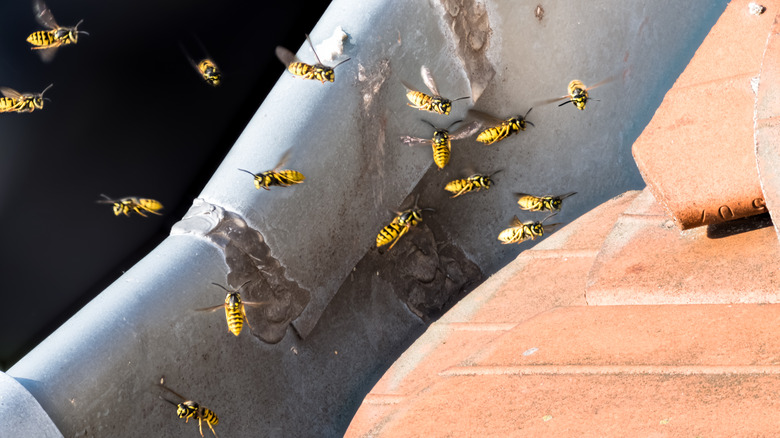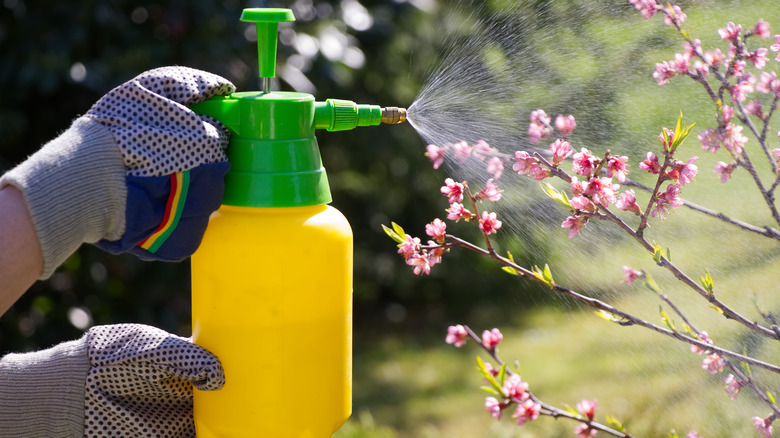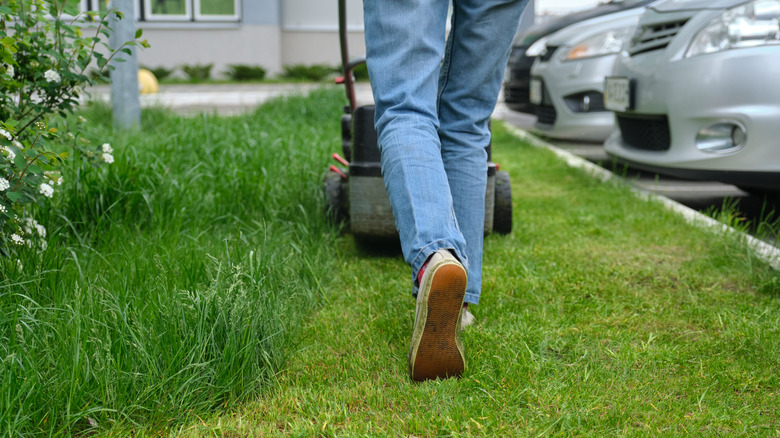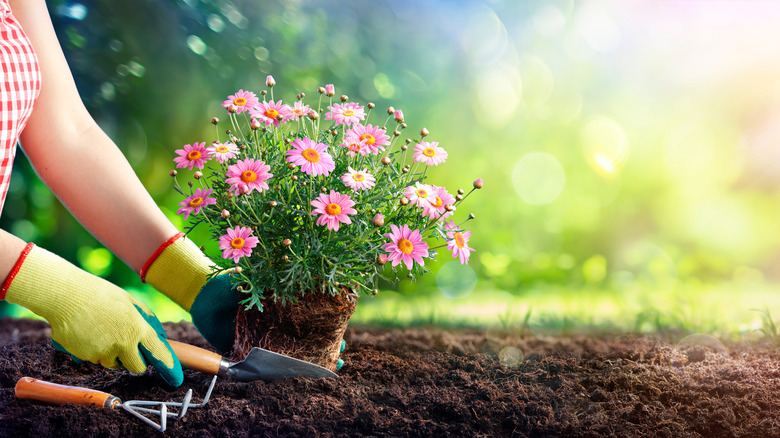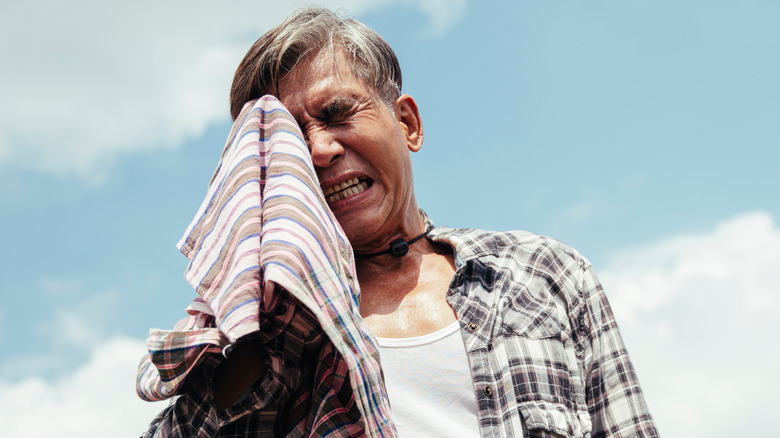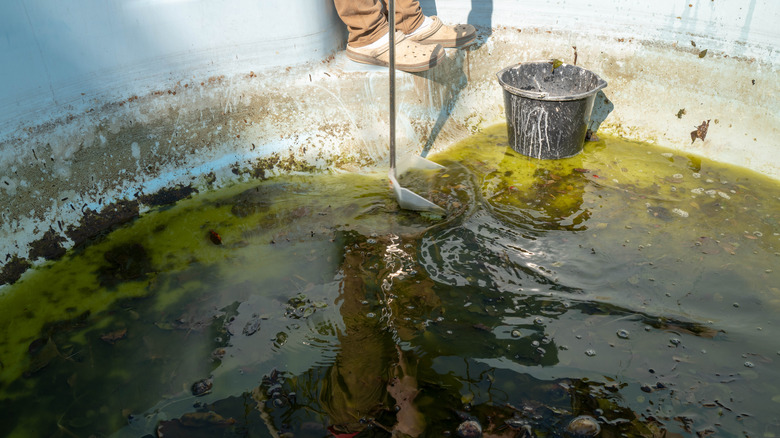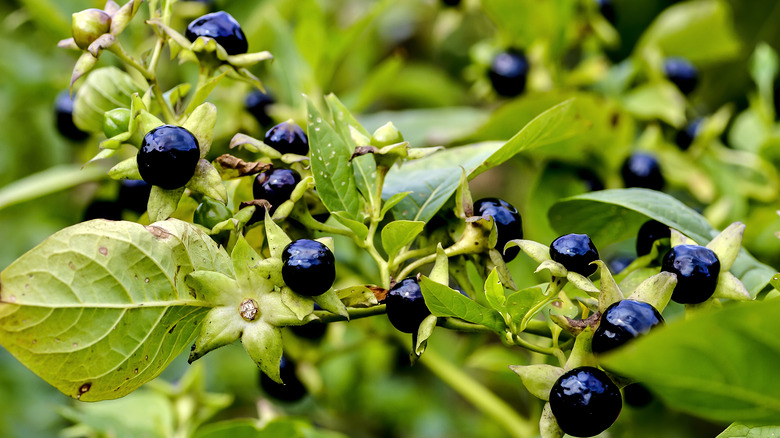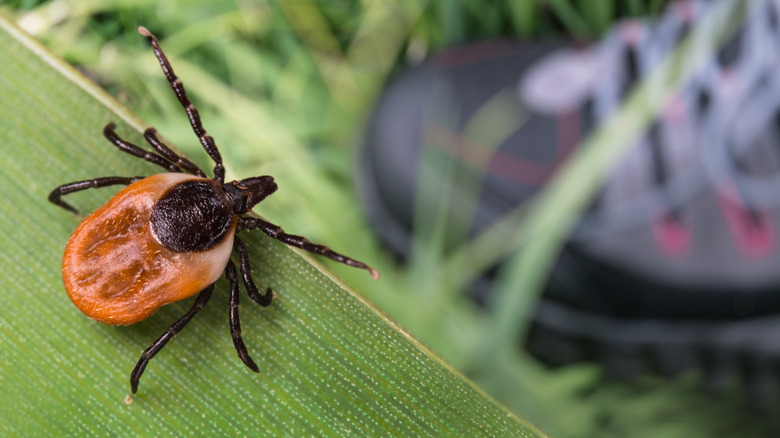Hidden Dangers That Are Ruining Your Yard
Let's be real: Our homes are our castles. And the property that surrounds our dwellings serves as a natural haven, a sanctuary, and a retreat where you can unwind and relax. A yard is a place where we can partake in exotic beverages, read juicy novels, sunbathe, listen to the greatest hits, and contemplate the ancient teachings of Plato amongst the roses and rhododendrons. Whatever floats our boats or pushes our buttons, a yard should be a special place far removed from the trials and tribulations of modern life. We can do in our yards as we please.
Yet even this sacred domain of domestic bliss and heavenly solitude is not immune to hidden dangers and unexpected pitfalls. According to LawnStarter, the yard is full of everyday hazards that can quite literally trip you up and end with an unexpected visit to the hospital. In the U.S., nearly 3.2 million people suffer serious injury each year in their yard. Don't be too alarmed, though, as most injuries sustained in the yard can be prevented through good old-fashioned common sense and identifying the risks before they become a dangerous threat. So, the next time you're out and about in the yard, here's what to watch out for to ensure you and your loved ones can continue having fun safely in the sun and enjoy the best possible yard experience.
A bad buzz
Picture this scenario. You're cooking up a storm on the barbecue, the wine and chilled beer are flowing, guests are enjoying your appetizers, and then, a high-pitched scream shatters the party atmosphere quicker than you can say "pest control!" Nothing kills a relaxed garden vibe quicker than buzzing wasps on the prowl. We all love that they're pollinators, but we don't want too many of these territorial and aggressive insects in our gardens — especially when we are entertaining there. According to the Centers for Disease Control and Prevention, hornet, wasp, and bee stings accounted for 1,109 deaths in the years between 2000 and 2017. Coupled with the threat of a nasty sting, wasps can quickly turn your yard into hostile territory and will ruin any notion of al fresco dining.
To prevent our buzzing little friends from turning up uninvited to the party, Gardening Know How recommended keeping a tight lid on any garbage cans, and not leaving any food or drinks uncovered. If you have fruit trees, be sure to pick up any fallen fruit. According to Ideal Home, burning citronella candles, sprinkling peppermint oil, staying away from bright colors in your yard, and growing plants with bold scents such as fresh mint are all great ways to discourage wasps from visiting. Swatting wasps is not an option because of environmental and cruelty concerns. Additionally, when a wasp is squished it lets out a chemical signal which gives the green light for other wasps to attack.
Fanning the flames
Who doesn't love firing up the coals and grilling up your favorite steaks, seafood, or veggies? There's no doubt about it — a good barbecue is great for the summertime soul. But if you don't respect the flames, an innocent barbecue can turn into a dangerous inferno. According to the Washington Post, each year, around 16,600 people end up in the emergency room due to a mishap sparked by a barbecue. A third of burn injuries are suffered by children less than five years old who have either touched or stumbled into the blazing grill. The National Fire Protection Association reported that between 2014 to 2018, barbecues were responsible for 8,900 fires at home.
No one in their right mind would want to ban barbecues from the yard, but there are a few safety tips you should always adhere to if you don't want your grilling to turn gruesome. According to Admiral, you should never leave the barbecue unattended. Insist that children and pets give the barbecue a wide berth. Be sure to have a bucket filled with water or sand close by in case an emergency arises. Ensure the barbecue is situated on a stable and flat surface, and at a safe distance from any flammable material such as decking, fences, sheds, trees, or bushes. Never attempt to move the barbecue before it cools down, and, although it may sound obvious, always use a trusted fire lighter on a charcoal barbecue and never petrol.
Toxic chemicals
Chemicals are often considered a quick fix for the common gardener, and we've all been tempted at some time or another to follow the science when it comes to keeping our prize roses free of ferocious slug infestations. However, chemical pesticides, herbicides, and fertilizers come at a high cost to the natural world. According to the Royal Horticultural Society, insecticides will kill many beneficial organisms alongside pests. Planet Natural stressed that although chemical fertilizers, pesticides, and herbicides help our flowers bloom and our lawns look in tip-top condition, they contaminate our water, the soil, and even our pets. They pointed to a study that suggests dogs who have been exposed to yards treated with herbicides are three times more likely to develop cancer.
The Carlson Law Firm reported that a growing number of U.S. states have outlawed the use of popular weed killer Roundup because its active ingredient glyphosate may be a potential human carcinogen. According to The Conversation, all common garden chemicals carry a health risk, but provided they are used sparingly, and provided you take safety precautions and follow the instructions on their use, there is no real risk to humans. Yet if you still cannot abide the thought of poisoning mother nature with chemicals, PETA advised that there are a whole range of natural alternatives such as lemon balm, human air, sage, parsley, garlic, and chives that can keep your plants free from being eaten alive and chemical warfare.
Lawn mower injuries
The long grass may be nice to disappear into when the sun is high and the mood is right, but an unkempt lawn is an eye-sore and something which nosy neighbors are prone to hold against you. Yet when you're mowing against all that growing, be careful, because lawn mower injuries are a very real threat. According to Newsweek, every year, lawnmowers are responsible for killing more people than alligators, sharks, or bears. A report by LawnStarter states that in the past decade, there have been over 3 million injuries sustained by U.S. citizens when in their yard and lawnmowers accounted for 855,850 of them. On average, 90 Americans die each year as a direct result of a lawnmower accident.
Researchers at John Hopkins University School of Medicine found that lawnmower injuries usually require surgery at an average cost of $37,000. The university's Dr. Deborah Schwengel explained, "Despite consumer education programs and warning labels, lawnmower injuries in the United States remain a serious public health concern." President and CEO of the Outdoor Power Equipment Institute, Kris Kiser, advised, "Before you use a mower, trimmer, blower, power washer, chainsaw, pruner, portable generator, or other piece of outdoor power equipment this season, it's important to refresh yourself on handling and safety procedures. You should take the time to do basic maintenance to ensure your equipment operates safely for the season and is ready to get the job done."
Bacteria in your soil
Gardening is all about working in harmony with mother nature, but some aspects of the job involve getting your hands dirty in a very literal sense. According to The Conversation, when mucking about in the soil, it's always wise to keep your gloves on, because there is a lot of nasty stuff in the earth that can enter your bloodstream through even the most inconspicuous of cuts or grazes. Soil, plants, manure, and compost all contain microorganisms that can cause serious infections. Clostridium tetani (which causes tetanus) is commonly found in soil, and sepsis-causing bacteria such as Escherichia coli are often found in the animal manure used in many gardens. The bacteria can enter via a slight cut from a gardening tool or rose thorn and in serious cases can kill, as was the case of a 43-year-old mother-of-two who died from septic shock less than a week after scratching her hand while gardening (via The Daily Mail.)
In another tragic yard accident, a 56-year-old ended up in intensive care after contracting legionellosis through handling a bag of garden potting mix (via Stuff). The bacteria legionella longbeachae is commonly found in potting soil and compost, and public health officials recommend the wearing of gloves when in close contact with either. According to Garden Know, a good pair of gloves will also protect keen gardeners from bugs, spiders, and snakes, all of which can bite and in some instances cause serious harm.
Too much sun and heat
Digging, potting, planting and pruning in the hot sun can be a perfect way to break a sweat and enjoy a workout as you transform your yard into a garden of delights — but be careful not to overdo it. When the sun is at its zenith, potting those plants for prolonged periods signals danger for the exposed gardener. Likewise, lying in the garden like a lobster sipping a rum cocktail in peak summer may seem relaxing at the time, but the reality tells an altogether grimmer story.
Consultant dermatologist, Dr. Bob Sarkany advised to cover up, put on a hat, and coat yourself with some strong sunscreen when working in the yard (via HVA Healthcare UK). He explained, "Ultraviolet in the sunlight over years 'chips away' and can damage the skin, causing it to look wrinkled. Some gardeners may also develop skin cancers on the sun-damaged skin. These are usually 'basal cell' and 'squamous cell' skin cancers." According to Gardener's Path, working in the shade of tall trees can help add a layer of additional protection when the sun is really fierce. To keep living large in your backyard, create a shady place to sit in, rock your shades, and relax.
Stagnant water
Water that runs is always a lot healthier than that which is stagnant, and standing water can pose a real health risk in your yard. That ancient water butt or neglected pond could be a breeding ground for bacteria, dangerous insects, and a convenient water hole for rats. According to Plumbing Nerds, insects flock to poorly-maintained swimming pools and large puddles caused by poor drainage to do their thing and make some love. In other words, your yard will soon be overrun with insects such as mosquitos who spread diseases such as Malaria, West Nile virus, dengue fever, Zika virus, and certain strains of encephalitis.
Stagnant water also attracts vermin, who prefer building their nests near a convenient source of water. So if you want to reduce your chances of an insect, mice, or rat infestation, it's best to ensure your lawn has proper drainage. Additionally, keep your swimming pool in immaculate condition and ensure anything that gathers water in your yard is well maintained. Stagnant water is a very real threat to you and your family. If young children or pets accidentally drink just a little of the stuff, it could spell big trouble. So do yourself a favor, and dry your yard out.
Poisonous plants
Just as all that glitters is not gold, not everything that grows in your garden is as easy on your health as it is on the eye. According to Fantastic Gardeners, there are quite a few poisonous plants to keep an eye out for. If you've got water hemlock, hydrangea, foxglove, oleander, elephant ear, lily-of-the-valley, philodendron, dumb cane, belladonna, ficus, desert rose, aloe, angel's trumpet, rhododendron, monkshood, or even daffodils adding a touch of color in your yard, you need to handle them with care, and keep them safely out of reach of your children and pets. Such plants are hugely toxic, and if even a small part of them is ingested, they can cause everything from nausea, vomiting, diarrhea, rashes, itches, blisters, and hives to painful and violent seizures and in the worst-case scenario, coma, and death.
According to Raising Children, the best way to avoid poisonous and dangerous plants in your yard is to simply avoid growing them. Yet if you're the adventurous type and enjoy surrounding yourself with exotic foliage that possesses a vicious beauty, ensure that any problem plants are fenced off from young children or adventurous pets. If a pet or loved one starts showing symptoms of poisoning, call a doctor or vet immediately.
Unsupervised pool time
There's nothing like hitting the pool after a hard-boiled day when both the temperature and your stress levels have soared like a supernova. The health benefits of splashing in the pool or simply lounging about on a giant inflatable unicorn float while sipping a refreshment are immeasurable. Yet if you're lucky enough to have a pool in your yard, you need to keep your wits about you to avoid certain dangers. According to the CDC, three children die each day from drowning. Pediatrician Marcee White explained, "Nearly half of parents say they think if a child was drowning nearby, they would hear him or her. Instead, drowning is quick and quiet" (via The Healthy).
Children should be supervised at the pool at all times. According to Make Safe Happen, the installation of a four-foot fence around your pool will prevent small kids from gaining access unattended, and a non-skid area and toy and furniture-free zone surrounding the pool's perimeter will help avoid slips and falls. Teaching kids how to swim (via Safe Kids) is the best protection against drowning, but familiarizing yourself with fundamental water rescue skills and CPR is advisable for any parents with young children and a pool.
Infectious ticks
Ticks may be small, but they can do a lot of damage, and if you have a lot of green in your yard, you need to get up to speed with tick control before the little critters turn around and bite. According to Gardening Know How, the disease-carrying ticks love to feed on the blood of humans and pets. There is a common misconception that ticks fly and jump — but they don't! They are patient beasts who lurk in shrubs or blades of grass and grasp on anything that happens to walk by. They explore the body until they find a juicy spot, and then they attack. They become bloated and sated before falling off to feast another day. While they are feeding, a tick can also infect you with a serious condition called lyme disease.
According to Garden Tech, most tick bites occur in a person's own lawn and garden, and the tiny ticks behind 98% of these bites are known as nymphs. These nymphs are hugely active between April and September, but there are a few simple remedies to stay on top of these incessant and demanding insects. Keep your tall grass trimmed, prune trees and shrubbery regularly, and clear out all the weeds and other assorted debris to keep your yard tick-free. If all else fails, invest in a product containing natural insecticides such as pyrethrins.
Unsafe trampoline use
Jumping for joy without a care in the world is the birthright of any child, and a trampoline in the yard offers all ages hours of countless fun, but if you're not careful, all that bouncing can lead to serious injury. According to Dart Goals, 95% of trampoline injuries occur in people's own yards, and statistics show the number of trampoline accidents is increasing year after year. The American Academy of Pediatrics strongly discouraged having a trampoline on your property.
Spine injuries and leg and arm fractures can occur on a trampoline, and more serious accidents have resulted in permanent paralysis and brain damage. Children under six should not be allowed to use the trampoline, as the repeated impact on their young bones could cause serious complications. To ensure your trampoline is as safe as possible, make sure it's at ground level to decrease the risk of injury, and utilize a big surface that affords plenty of space for the child. Always supervise children when using the trampoline, and ensure its springs, supporting bars, padding, safety net, and landing surface are all in proper working order. Take care, and happy bouncing!

